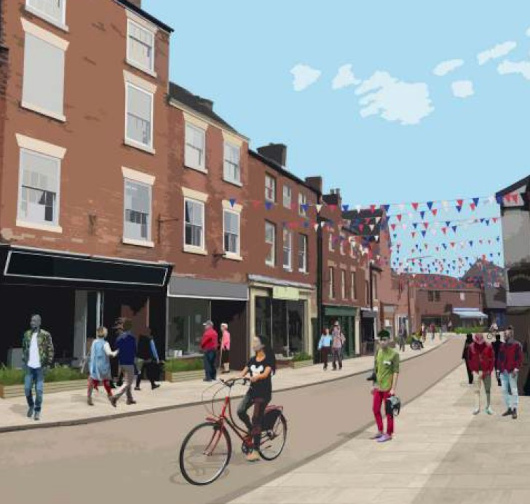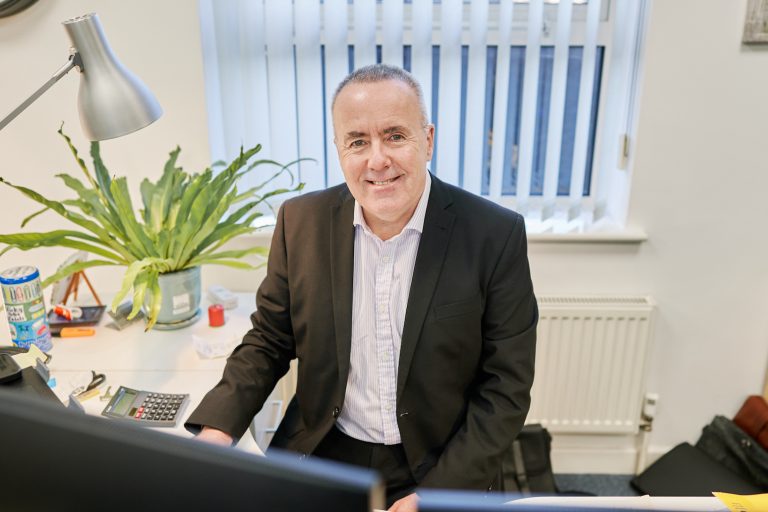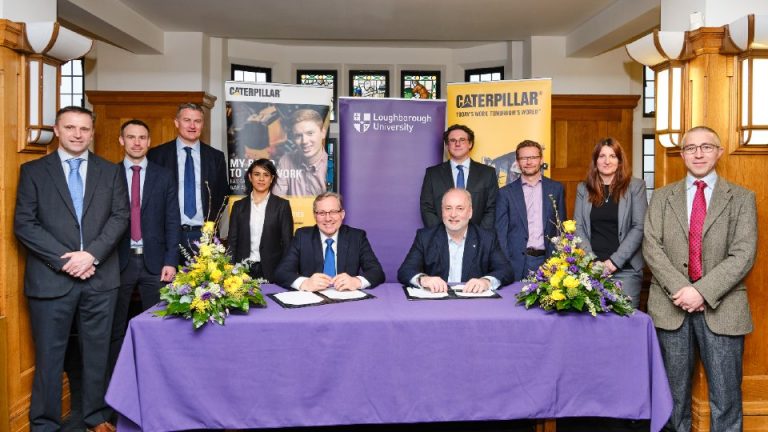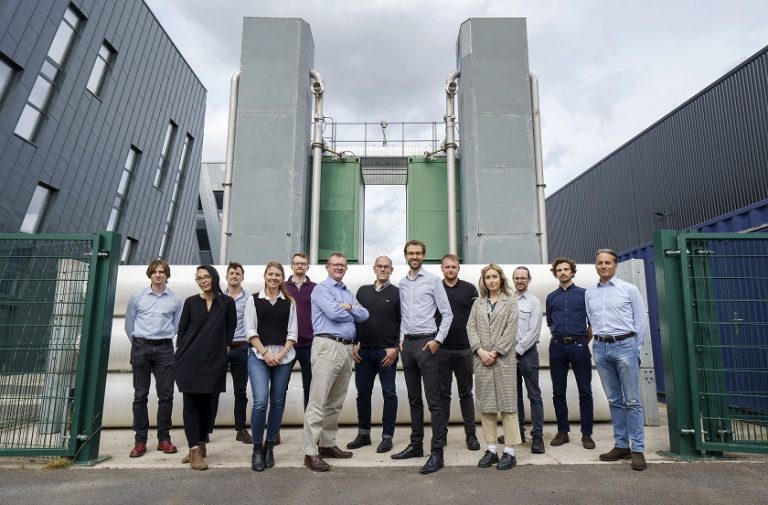
Partners have issued a rallying cry as the £15 million bid to transform Ashbourne town centre goes forward to the Government’s Levelling Up Fund for consideration.
The bid, named ‘Ashbourne Reborn’, is being led by Derbyshire Dales District Council. It has been developed through close working with a number of local partners who have brought forward project ideas, identified opportunities and raised match-funding for the bid.
The partners include Ashbourne Town Team, Ashbourne Town Council, AshCom, Ashbourne Methodist Church and Derbyshire County Council.
There are two distinct project areas. The first is a series of transformed public spaces including Market Place, Victoria Square, Millennium Square and Shrovetide Walk, while the second focuses on a new community hub, transforming the Methodist Church into a multi-purpose community building.
New traffic management plans will be transformational to the pedestrian experience in Ashbourne, while the hub will provide a wide range of event and meeting spaces, a performance venue and flexible work areas with high quality digital provision.
If successful, work could start as early as the end of this year.
Last month the District Council’s Community & Environment Committee unanimously gave the green light for the submission to go forward to the Government’s Levelling Up initiative.
District Council leader Councillor Garry Purdy said: “This project to date has been a brilliant example of local partnership working and I want to thank all partners for their invaluable input.
“I understand it is the biggest capital grant bid ever submitted by this council and, if successful, I am confident it will create vibrant public squares and yards in Ashbourne, reversing decline in parts of the town and giving lots of reasons to visit in a safe and welcoming environment. We want to restore pride in place in Ashbourne.”
Connections between town centre spaces will be improved and a comprehensive set of upgrades along Compton, Dig Street and St John Street will create a far better pedestrian experience, reducing the impact of vehicles and improving safety.
Councillor Simon Spencer, Derbyshire County Council’s deputy leader, said: “I’m delighted that this project for Ashbourne has been approved by the district council.
“I’ve been working with the Ashbourne Town Team for some time on a variety of issues and I’m delighted to have been able to support them with their valuable work. Everyone involved, including all the local county and district councillors, have worked hard to get to this point and I hope the Government are able to find the money that is needed.
“All the work planned will make a massive difference to the town, for those who live here, and those who visit us, and I look forward to work starting as soon as possible.”
A key part of the project is to celebrate the town’s heritage while enabling a wide variety of future events to bring new life to the centre of Ashbourne, creating an environment where businesses will want to locate and invest, and residents and visitors spend time whilst supporting the local economy.
Anne Wright, chair of Ashbourne Town Team, said: “We believe the public realm, traffic management and pedestrian projects are at the heart of the bid and will be transformational for the town. The success of this initiative is absolutely vital to kick-start the local economy and revive a positive experience in the town centre for residents and visitors.
“From our local knowledge and experience we know that the implementation of improvements enabled by the Levelling Up Fund will encourage and support substantial further investment by local investors, giving them the confidence to back the town.
“The Town Team is really pleased to have helped bring together the amazing work being done by AshCom, the Town Council and the Methodist Church to turn our strategy into reality.”
The proposed community hub at Ashbourne Methodist Church, offering a fresh, modern range of accommodation options for groups and families and an outdoor riverside garden event space, will also link to a range of sustainable transport options to improve connectivity, including charging for e-bikes and scooters and connections to the Tissington Trail.
Rev Tim Morris, Superintendent Minister of Ashbourne Methodist Circuit, said: “Ashbourne Methodist Church has been contributing to the local community for over 200 years and we are committed to contributing for many generations to come. We are an active church with significant community activities taking place on our premises already and it is our vision to develop our buildings, and, most importantly, the activities taking place in them, to become a seven-days-a week church, community hub and performing arts and events space.”
Tony Walker CBE DL, Link Development team leader, said: “We are thrilled to be a part of the Derbyshire Dales District Council Levelling Up Fund bid. We have been working for over six years on our project to create a modern set of fully accessible facilities which will provide an inclusive, comfortable and sustainable environment for community and town activities in a heritage set of buildings.
“We already have planning permission, listed building consent and are ready to start as soon as we get the funds. Our fundraising, including funds received, committed and expected is over a million pounds already. However, this does not enable the completion of much of our plans. A LUF award would be totally game changing for us, enabling us to deliver all our plans.”
The package will ensure Ashbourne takes its rightful place within the regional visitor economy, providing an attractive and vibrant environment that draws in residents, visitors and businesses and re-establishes its identity as a flourishing market town.
Ashbourne Town Council said: “The Town Council are pleased that their scheme to redevelop the area known as Millennium Square is included as part of the Levelling Up Fund bid. This will make a much needed improvement to the centre of the town and will complement the other schemes put forward as part of the bid.”
The final bid submission includes detailed calculations of the value for money of the package, comparing the economic benefits and economic costs to produce a Benefit Cost Ratio (BCR). The BCR for the Ashbourne package is comfortably above the requirement set by government and indicates that the bid should perform well against value for money requirements.
Sue Bridgett for AshCom said: “AshCom is pleased to enthusiastically endorse the proposal that has been developed for Ashbourne, both in the strength of its content and strategic vision and also in terms of the partnership working across a range of organisations and agencies which came together to make the bid as coherent as it is.
“The projects prioritised can help to take the town forward in an exciting and necessary way for residents, businesses and visitors alike. We wish the bid every success.”
The support of Derbyshire Dales MP Sarah Dines is crucial as the bid goes forward to Government. The introduction to the bid submission states: “Like many market towns, Ashbourne is facing the challenge of re-inventing itself to ensure that it remains vibrant and relevant for the 21st century.”
The bid has been supported by the District Council’s expert consultant Michael Rich, Bentley Project Management, Amion, Lathams and Thomas Lister.

























